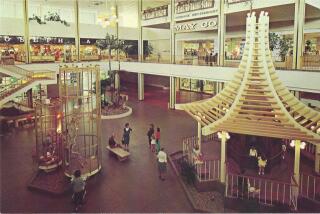Palmdale Votes Aid for 5 Car Dealers : Economy: The troubled Antelope Valley Auto Center will get $2.45 million in assistance from the city.
- Share via
Palmdale is offering to jump-start five recession-battered car dealerships in an auto mall, recently opened under city sponsorship as a source of sales tax revenues, by spending $1.2 million to help promote sales and lending the dealers another $1.25 million.
“We want to give them some resources they can draw on until the economy is better,” Councilman Jim Ledford said Wednesday. “They opened during the recession and that’s hurt them. We feel like they made commitments to Palmdale and we wanted to help them.”
The plan to revive the troubled Antelope Valley Auto Center, which opened in May after receiving $2.6 million in city redevelopment funds, was approved in a 4-0 vote Tuesday night by the Palmdale City Council, which also acts as the city’s Community Redevelopment Agency.
The action follows a city report strongly recommending aid to the dealerships.
“Due to unanticipated economic conditions, the continued viability of the auto center has necessitated that temporary financial assistance be provided,” the report states.
City officials believe that the five dealerships in the 65-acre auto mall at Avenue P-8 and the Antelope Valley Freeway will eventually generate large amounts of sales tax revenues for Palmdale, but they need help to survive the recession, Ledford said.
“We’re looking at a 25-year plan here,” Ledford said. “As we develop here, the mall will grow with us and will bring substantial benefits.”
Each dealership is eligible for a $250,000 loan at 7.5% interest, payable over a five-year period beginning in 1993. The money is not from the city’s general fund but rather from the Redevelopment Agency, said Redevelopment Manager Danny Roberts.
The dealers, who have struggled since moving there, had asked the city for a loan several months ago, Ledford said. The city decided on its own to put up the additional $1.2 million for sales promotion, which will be spent at the rate of $100,000 a month for a year. The city will also spend $180,000 to help maintain landscaping and other facilities at the site, which features a huge electronic billboard visible from the Antelope Valley Freeway.
“We felt better helping them develop a marketing plan. We wanted to make sure it would be used to promote the auto mall,” Ledford said.
Four of the mall’s dealerships have already opened. They are Antelope Valley Nissan-Volkswagen, Rally Chevrolet, Holiday Buick-Oldsmobile and Rally Pontiac-Cadillac-GMC. Another dealership, Robertson Honda, was scheduled to begin operations last fall but has not opened although its building is largely complete.
While it is unusual for a city to lend money to a car dealer, it is by no means unprecedented, Roberts said. South Gate and Downey both used public funds last year to help out car dealers, he said.
The Antelope Valley Auto Center is not the first Los Angeles-area auto mall to feel the pain of the recent recession. After plummeting sales in 1990 and 1991, Claremont Auto World went bankrupt last year and has since reopened as Claremont Auto Center.
Nor is Palmdale the only area city to see its investment in an auto mall threatened by the recession. Duarte city officials once envisioned a nine-dealer “210 Freeway Autoplex,” but gave up the plans last year after spending $15 million to purchase and clear the site.
In the Antelope Valley, both Palmdale and Lancaster were engaged for several years in a bitter fight to woo local dealerships to rival auto malls. Lancaster, where all of the dealers in the Palmdale mall were originally located, has a rival auto mall currently under construction.
Palmdale initially had eight auto dealers lined up for its auto mall. But one, Johnson Ford, has since dropped out, while two others, Grubl BMW-Subaru and H.W. Hunter, have put moving plans on hold because of the recession.
Roberts dismissed the idea that private auto dealers may become dependent on public funds, instead referring to the cash infusion as “a onetime thing.”
“We absolutely don’t see this going beyond one year,” Roberts said. “If the economy hasn’t turned around by then, I don’t think there’s anything we can do for them.”
More to Read
Inside the business of entertainment
The Wide Shot brings you news, analysis and insights on everything from streaming wars to production — and what it all means for the future.
You may occasionally receive promotional content from the Los Angeles Times.










